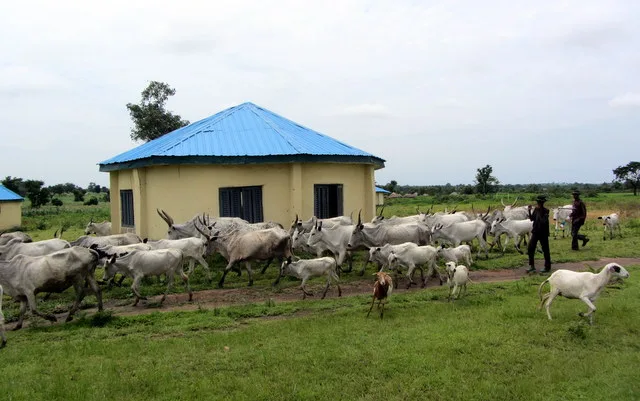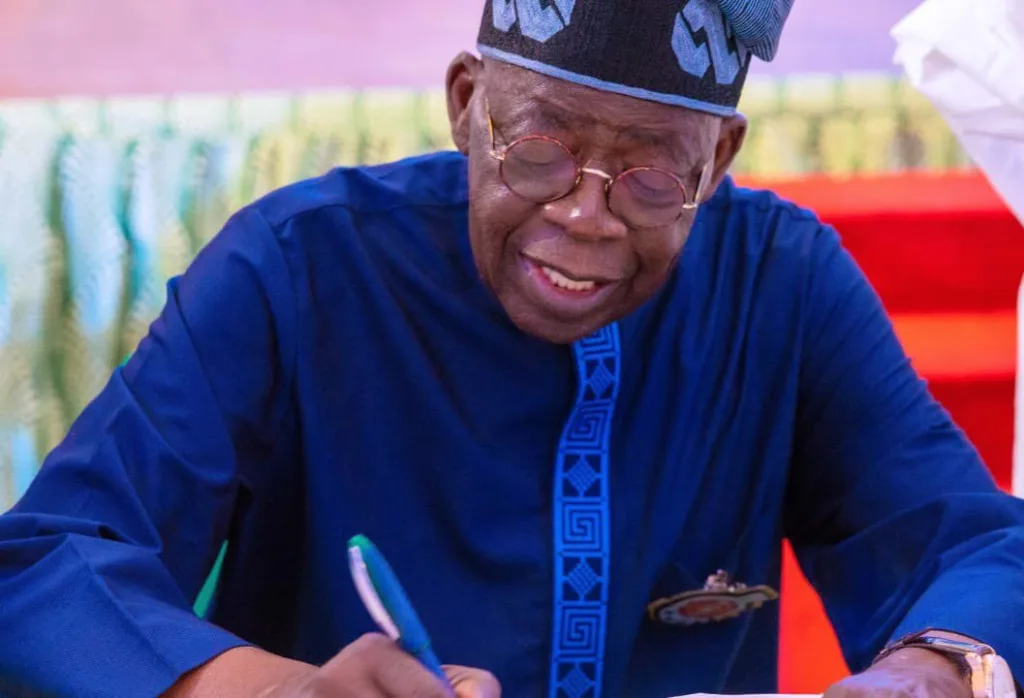Nigerians were greeted with President Bola Tinubu’s approval of the creation of a new Ministry of Livestock Development.
This decision came as the President inaugurated the ‘Renewed Hope Livestock Reform Implementation Committee’ at the State House, Abuja. The committee is mandated to provide sector-focused solutions to address the age-long farmers-herders crisis.
Last year, the National Livestock Reforms Committee had recommended that the Tinubu administration should create a “Ministry of Livestock Resources” to, among other deliverables, reduce decades-long conflicts between farmers and nomadic cattle herders across the country.
Former Kano State Governor, Abdullahi Ganduje, disclosed this to State House correspondents when he led the committee in an audience with the President.
This formed part of 21 recommendations put in a document submitted to the President to enhance the Federal Government’s holistic response to the lingering cases of bloodshed.
The document outlined details of the proposed solutions where the committee advocated a reform agenda examining conflict mitigation and resource management. “This agenda should include the establishment and resuscitation of grazing reserves, as suggested by many experts and well-meaning Nigerians and other methods of land utilisation.
Create the Ministry of Livestock Resources in line with practice in many other West African countries. In the alternative, Federal and State Governments should expand the scope of existing Departments of Livestock Production to address the broader needs of the industry”, it added.
Ganduje explained the complexity of the challenge at the time and said that, the government’s approach must address the four kinds of herders: those who settle at home, nomadic herdsmen traversing the country, those from neighbouring West African countries as well as those who have settled among certain ethnic tribes and indigenised.
The ex-governor lamented the sector’s low productivity, saying it made Nigeria import-dependent, draining scarce foreign reserves for importing dairy, meat, and other livestock products. He argued that the conflicts are resulting in killings of citizens and loss of livelihoods, further affecting peaceful coexistence in the country.
Meanwhile, mixed reactions have trailed the decision of the Federal Government to establish the new ministry. The Miyetti Allah Cattle Breeders Association of Nigeria (MACBAN) has commended President Tinubu for establishing the ministry.
The association’s President, Baba Othman-Ngelzarma, said the establishment of the ministry would unleash the potential of the trillion-naira livestock industry. He noted that the ministry intends to generate high-quality and efficient employment opportunities throughout the livestock value chain with the aim of enhancing the Nigerian economy.

Speaking with FarmingFarmersFarms, the Chairman, All Farmers Association of Nigeria (AFAN), Lagos State Chapter, Dr. Femi Oke also said the establishment is “a welcome development”.
A farmer with TOD Farms, Olalekan Ajao, said that the new ministry “is long overdue. Livestock is the heart of the nation; our consumption does not commensurate with our production”.
On her part, the Director, Institute of Food Security, Environmental Resources and Agricultural Research, Federal University of Agriculture, Abeokuta (FUNAAB), Prof. Alaba Jolaoso, informed that the creation “is good idea since there are lots to achieve considering the current state of insecurity due to activities of herders. But mixed agriculture is still the best because the waste of one is the raw material for the other. Overall, it is a good development, if there will be sincerity and it will not be another means of wasting national resources”.
However, a former aide to ex-Vice President of Nigeria, Prof. Yemi Osinbajo (SAN), Mr. Laolu Akande, said Nigeria may not need the new ministry. Akande said though a lack of will and expertise are hindering the implementation of the National Livestock Transformation Plan (NTLP), saying that the country may not need another ministry for livestock.
The former presidential aide stated that Nigeria had been locked in decades-long clashes between herders and farmers. The tussle over access to land, pasture, and water has exacerbated the crisis, leading to loss of lives and properties. Hence, previous governments and some state governments have introduced several measures including the NLTP and a ban on open grazing to address it, adding that if the NLTP introduced by the administration of ex-President Muhammadu Buhari was implemented, it would transform the livestock industry in Nigeria and end the clashes.
A mechanical engineer with vast experience in food processing and storage systems as well as business development and project management, Engr. Armand Khadir also feels otherwise. He stated that for “people in our continent, it is imperative to have decentralised and collective organisations that will probably be more dynamic and result-oriented than a national government institution … it is better to have local collective approaches to local problems since the affected communities are motivated to act in quick response to local issues, being on the spot. Therefore, forming local cooperatives lend themselves as a natural solution-solving problems of and giving voice to local stakeholder entities”.
The Chair, Agriculture Law Committee, Nigerian Bar Association Section on Business Law (NBA-SBL), Aderonke Alex-Adedipe lent her voice, saying “in an ideal world, the intention will be to promote food security, as is currently a crisis in Nigeria. But, given our reality, I’m not sure how much will be achieved. This may just be another theatrics to create additional office. Remember, they already, more or less, have food security, which is a stand alone”.
The publisher, African Science and Tech Digest (Afrsciencetech Magazine), Mr. Bonny Alaneme posits that “the proliferation of ministries and agencies is not the best approach … The main problem is honest implementation of several laws, policies and regulations.
The Federal Department of Livestock and Animal Husbandry can be strengthened and empowered to do more, if there is the political-will and sincerity of purpose. So, creating an additional ministry is politically-motivated”. Meanwhile, President Bola Tinubu has disclosed that the name of the minister for the new ministry would soon be announced and is to be forwarded to the Senate for screening and confirmation.

